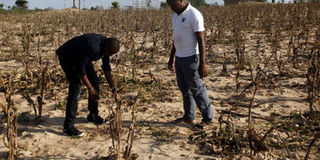Ending hunger in Africa doable task

This image taken on September 29, 2017 shows a dried up maize farm in Ganze, Kilifi County. The county is experiencing drought. Governments and policymakers have a major role in ending hunger. PHOTO | LABAN WALLOGA | NATION MEDIA GROUP
What you need to know:
- Conflicts, civil insecurity and extreme weather patterns are the main drivers of hunger, food insecurity and malnutrition.
- African farmers, especially the small-scale ones, are at the frontline in the fight against hunger.
A high-level event held on January 27 on the sidelines of the 30th Ordinary Session of the Assembly of Heads of State and Government of the African Union (AU) in Addis Ababa discussed progress in eradicating hunger in Africa.
Organised by the Food and Agriculture Organisation of the United Nations (Fao), in partnership with the African Union Commission (AUC), the Ethiopian Government and the United Nations Economic Commission for Africa (ECA), it focused on three key thematic areas: Policy, experience sharing and multi-stakeholder dialogue.
Participants at the meeting, called to review the continental target of ending hunger in Africa by 2025, noted that despite progress having been made, the task was a complex issue that calls for the concerted efforts of all the stakeholders.
FOOD SECURITY
The forum noted that several African countries had made remarkable progress to align their development policies, programmes and national visions to the 2014 Malabo Declaration on Accelerated Agricultural Growth and Transformation for Shared Prosperity and Improved Livelihoods.
Emphasis had been put on the third pillar of the Comprehensive Africa Agriculture Development Programme (CAADP), which aims at increasing food supply and reducing hunger by raising smallholder productivity and improving responses to food emergencies.
The efforts are also aligned with Sustainable Development Goal 2, which seeks zero hunger by 2030.
A Fao report, Regional Overview of Food Security and Nutrition in Africa 2017, however shows that the food security and nutrition situation was worsening in absolute terms.
UNDERNOURISHMENT
Undernourishment in sub-Saharan Africa rose from 20.8 per cent in 2015 to 22.7 per cent in 2016 —from 200 million to 224 million cases.
Conflicts, civil insecurity and extreme weather patterns are the main drivers of hunger, food insecurity and malnutrition.
In eastern Africa, Somalia and South Sudan are among the four countries where pre-famine conditions were declared by the international community last year to have the highest number of undernourished people in Africa.
Marginalised groups and rural communities are the most affected.
Most of Africa’s poor and hungry populations live in the rural areas and depend on agriculture and related activities for their daily income and livelihoods.
AGRICULTURE
However, despite the numerous challenges, African farmers, especially the small-scale ones, are at the frontline in the fight against hunger.
Agricultural and rural transformation are, critical to not only achieving food security and nutrition, but also addressing many other challenges, including building resilience.
Governments and policymakers have a major role in ending hunger.
Evidence-based policies, strategies and programmes that support and promote sustainable agriculture, food security and rural development will guarantee farmers quality and affordable inputs and markets.
Governments need to strengthen institutions meant to ensure food security within their borders and adopt other holistic measures.
They must also ensure that safety nets and other social protection are put up to cushion communities from extreme hunger.
PARTNERSHIPS
Vulnerable communities need to be empowered with the appropriate social interventions that catalyse production and productivity by linking food consumption with production — for example, through home-grown school feeding programmes.
Forging partnerships and stakeholder engagement across sectors is crucial in achieving nutritional outcomes through the promotion of sustainable agriculture, health and education.
Creating youth employment in agriculture and agribusiness will eradicate economic strain, crime and discourage migration within and out of the continent.
Despite shrinking jobs in agriculture and agribusiness due to urbanisation and automation, productivity in farming can be increased through innovation.
CORRUPTION
The success will depend on transparency and commitment to public service with zero tolerance to corruption.
Good governance, political stability, peace and security are paramount in eradicating hunger.
An unstable or insecure population cannot grow their own food or contribute to economic development.
To win this war, Africa should silence all other guns and focus on the fight against hunger.
Mr Aw-Dahir is senior officer (Program and Partnership) at FAO Sub-Regional Office for Eastern Africa, Addis Ababa. [email protected]




